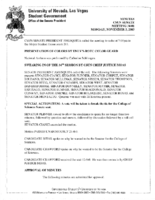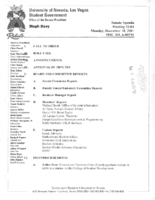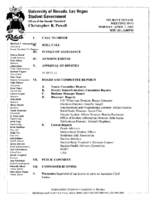Search the Special Collections and Archives Portal
Search Results

Meeting minutes for Consolidated Student Senate University of Nevada, Las Vegas, April 07, 1993
Date
1993-04-07
Archival Collection
Description
Includes meeting agenda, minutes, and a KUNV radio program guide.
Text

Meeting minutes for Consolidated Student Senate University of Nevada, Las Vegas, April 24, 1995
Date
1995-04-24
Archival Collection
Description
Includes meetin agenda and minutes, along with additional information about senate bylaws, reports, proposals, and the Mark Huff & The Inflatables Appearance Agreement.
Text

Meeting minutes for Consolidated Student Senate University of Nevada, Las Vegas, March 29, 1990
Date
1990-03-29
Archival Collection
Description
Includes meeting agenda and minutes.
Text

Interview with Wendell D. Weart, April 18, 2006
Date
2006-04-18
Archival Collection
Description
Narrator affiliation: Geophysicist: Sandia National Laboratories
Text

Interview with Dale Fraser, March 2, 2005
Date
2005-03-02
Archival Collection
Description
Narrator affiliation: General Manager, Reynolds Electrical and Engineering Company (REECo)
Text

Meeting minutes for Consolidated Student Senate, University of Nevada, Las Vegas, February 02, 2004
Date
2004-02-02
Archival Collection
Description
Includes meeting minutes. CSUN Session 34 Meeting Minutes and Agendas.
Text

Meeting minutes for Consolidated Student Senate, University of Nevada, Las Vegas, November 03, 2004
Date
2004-11-03
Archival Collection
Description
Includes meeting agenda and minutes, along with additional information about contracts and promotional campus agreements.
Text

Meeting minutes for Consolidated Student Senate University of Nevada, Las Vegas, December 10, 2001
Date
2001-12-10
Archival Collection
Description
Includes meeting agenda and minutes , a senate resolution, and rules for the 32nd senate session.
Text

Meeting minutes for Consolidated Student Senate, University of Nevada, Las Vegas, March 08, 2004
Date
2004-03-08
Archival Collection
Description
Includes meeting minutes, along with additional information about Rebelpalooza.
Text

Meeting minutes for Consolidated Student Senate, University of Nevada, Las Vegas, April 07, 2003
Date
2003-04-07
Archival Collection
Description
Includes meeting minutes and agenda, along with additional information about bylaws and letters.
Text
Pagination
Refine my results
Content Type
Creator or Contributor
Subject
Archival Collection
Digital Project
Resource Type
Year
Material Type
Place
Language
Records Classification
